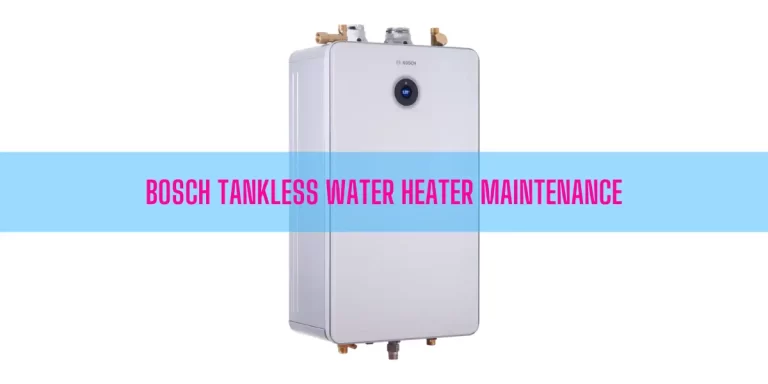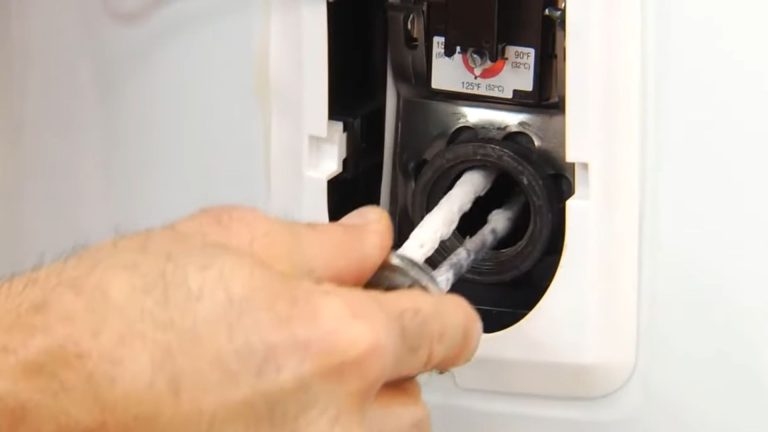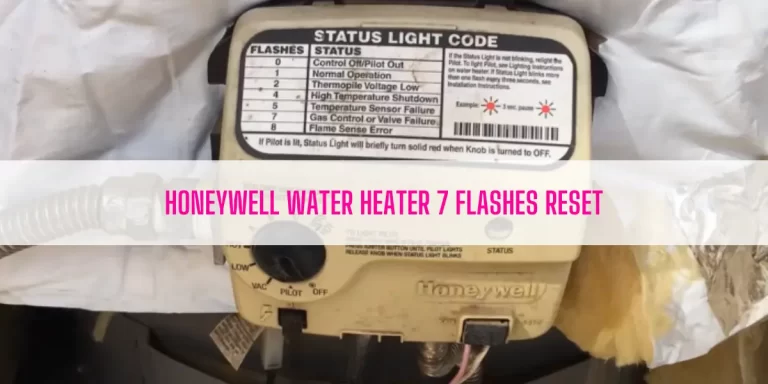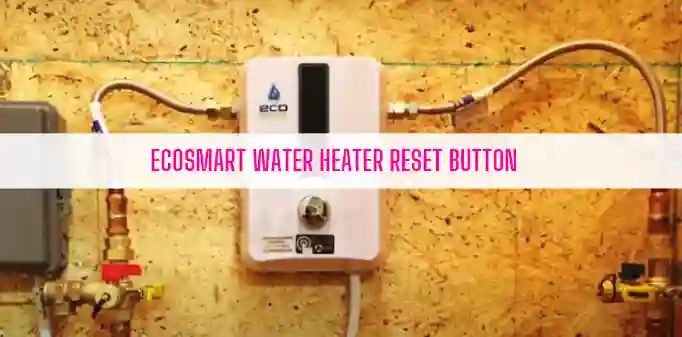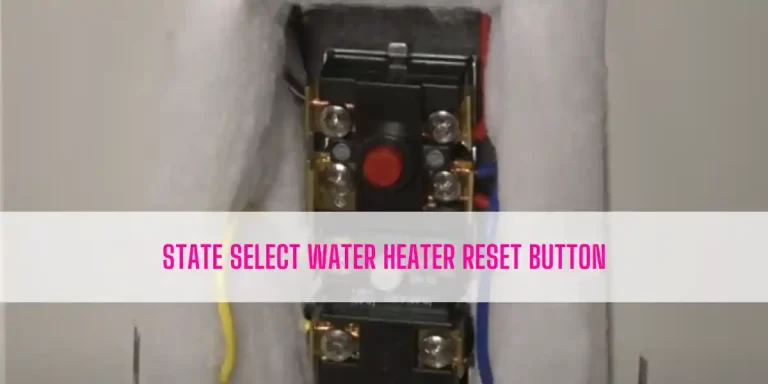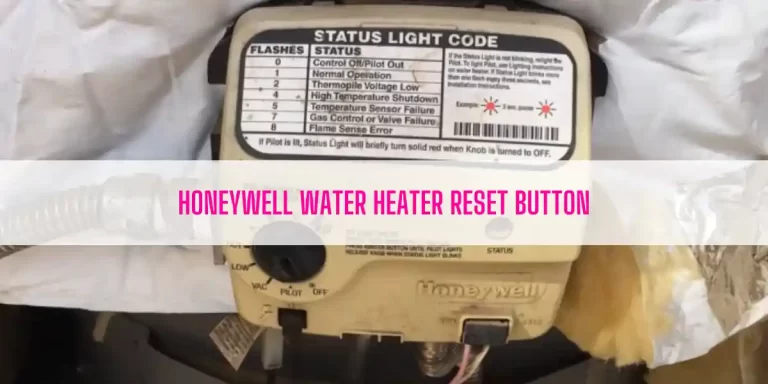Rheem Water Heater is leaking due to:
- Corrosion or rust
- Sediment buildup
- High internal pressure
- Age of the water heater
- Loose drain valve
Apart from this, you will learn about the parts prone to leak. Most importantly, I will walk you through troubleshooting steps to stop the leak.
Without further ado, let’s dive in.
What Does Cause Your Rheem Water Heater To Leak?
Corrosion, sediment buildup, and high internal air pressure are possible reasons for a leaky water heater.
Corrosion or Rust
Corrosion is the first culprit that can throw a wrench into work. It’s a gradual electrochemical reaction. When the metal reacts with the oxygen in water, it will cause rust. And the rust keeps eating away the metal until it corrodes.
You can detect water heater corrosion in two ways- water discoloration and water heater leaks.
Discoloration of the hot water is the first sign of corrosion. If you notice hot water with an orange or red hue coming out of the showers or sinks, I bet your water heater gets corroded.
Water heater corrosion can also develop a leak. Due to corrosion, the metal parts may break down and cause a hole or leak.
Sediment Buildup
Mineral deposits like iron in water can make a nest at the bottom of the water tank. It creates a thick layer that could block access to the burner or create a barrier between the heating element and the water. As a result, the burner runs longer.
If you have an electric model, the heating element takes a long time to heat the water. Due to this, the metal parts get overheated or wear and tear your water heater, which can develop a leak.
High Internal Pressure
Pressure can build up within the water heater tank. This incident will occur due to a too-high temperature setting or a faulty T&P valve. As a result, the excess pressure will try to escape through the tank wall where it’s thinnest.
Age of the Water Heater
Tank water heaters typically last 8-10 years. When it reaches the end of its lifespan, materials can deteriorate, and the corrosion becomes more evident. As a result, the water leaks through the weak or damaged parts. I recommend you inspect the water heater regularly and replace the susceptive parts to mitigate the risks associated with an aging water heater.
Loose Drain Valve
The drain valve helps you flush sediment buildup from the water tank. If the drain valve gets defective, water will leak slowly. You can fix this issue by tightening the drain valve. Ensure the seal of the valve doesn’t get damaged.
What are points or parts prone to leak on the Rheem Water Heater?
If you observe your Rheem Water Heater is leaking, it could be from various parts, such as the vent collar, T&P valve, or drain valves. This chapter will show you all the possible leaking points or parts causing the water leak.
Rheem Water Heater Leaking From Top
A Rheem water heater is leaking from the top due to several reasons, including:
- Loose inlet and outlet pipes
- A leaky vent collar
- A faulty T&P valve
- A defective anode rod
Loose Inlet and Outlet Pipes
Every water heater, whether it comes from Rheem or other brands, has inlet and outlet pipes. If you observe the water pouring out from the top of the tank, the cold supply inlet and the hot water outlet pipes are first to blame.
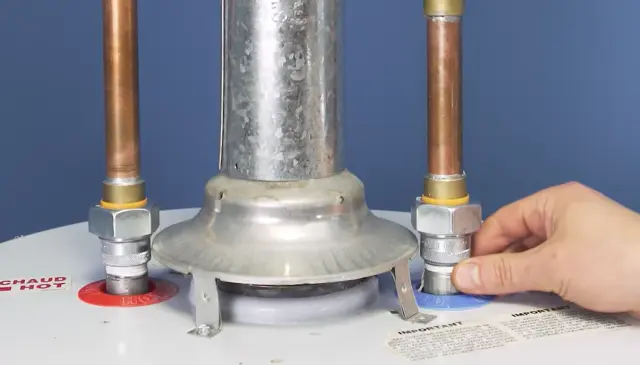
Inspect the threaded connection with your finger into the tank to feel whether they get wet or not. Then, check every connection between the pipes. Also, take your eyes close to each point where the pipes meet dielectric nipples and other fittings.
Therefore, the fittings themselves are prone to corrode over time from where the water can be dripping out.
How To Fix:
If you see the water coming out of the connection points, tightening up the pipe will do the trick for you. Just use a wrench to secure the pipes tightly.
On the other hand, you should replace the dielectric nipples if it gets corroded. Keep in mind; it’s a bit challenging to pull out the nipple. But it will be a breeze to remove the nipple if you know how to do it correctly.
Just set up a ratchet strap on your water heater and a cheater bar on the wrench on the nipple. With one pull the strap and the other one to push the wrench. It will help remove the nipple without knocking over the entire unit. Either way, you can check the following tutorial to learn how to repair the nipple:
Lastly, don’t hesitate to replace the fittings if they get corroded.
A Leaky Vent Collar
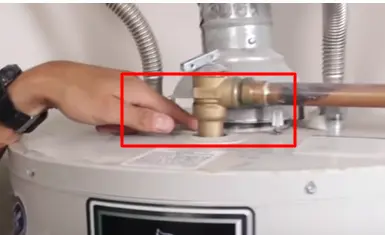
Rheem Water Heater Leaking From Collar Vent! Yes, water may come out of the vent collar. If it’s leaking out of the vent collar, usually what you are going to see is a stream of mist. It’s because there is a little tiny pinhole that sprays water up into the vent or out the side. The sad news is- you can’t repair it.
How To Fix:
As this problem is not repairable, you need to spend a lot of bucks to replace the bad boy. However, I recommend you call a certified plumber if he could do some help.
A Defective T&P Valve
Water pouring out from the top of the tank is an indication of a faulty temperature and pressure valve. This valve is mostly known as a pressure relief valve. It’s a safety feature of every water heater.
When the inside temperature or pressure starts climbing above a certain level, it runs the risk of exploding your water heater. But the T&P valve avoids this potential danger. If the pressure goes up to the safety level, the pressure relief valve opens itself to allow some water to drain to release the pressure. It’s a normal job for the T&P valve. But you can assume it’s because of a leak.
Secondly, the T&P valve is truly at fault, which is responsible for leaking water from the top of the tank. A simple test will let you identify whether the temperature and pressure relief valve goes bad or not.
Open the T&P valve with your hand and the pressure will escape. If your water heater doesn’t pass this simple test, you should replace the pressure relief valve.
How To Fix:
There is no option except to replace the T&P valve if it goes bad. Follow the below steps to change the temperature pressure relief valve on your Rheem water heater.
- Connect a garden hose to the bottom of your water heater and place the other end of the hose to the nearest floor drain.
- Make sure you close the shut-off valve at the cold water inlet line. Also, don’t forget to open a hot water faucet somewhere in your house.
- Now, open the drain valve to drain water. If your water heater has a top-mounted T&P valve, you should drain at least a gallon of water. Otherwise, you need to drain up to 10 gallons of water for a side-mounted T&P valve.
- Disconnect the run-off tube attached to the T&P valve. Then, pull out the pressure relief valve using a wrench.
- Finally, install a new temperature and pressure relief valve. Ensure you use Teflon tape to seal the thread.
Anode Rod Gets Extensively Corroded
Rheem Water Heater Leaking From Anode! Either an anode rod that gets extensively corroded or the failed pipe dope on the thread is responsible for water to leak out from the top of the water heater.
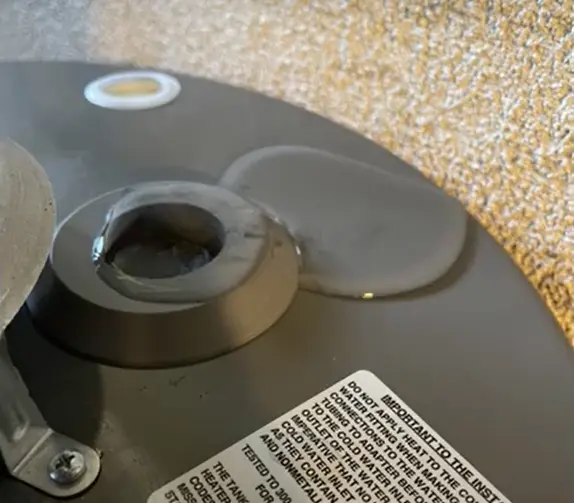
If the water is coming out of the anode holes after filling the water heater, the pipe dope on the tread may be at fault.
On the other hand, the anode rod of your Rheem water heater gets corroded, which causes the anode rod fittings to leak.
How To Fix:
I’m pretty sure there is a problem with the pipe dope on the thread if the water is pouring out of the anode hole after filling the heater. Regarding this, you should follow the below steps to fix this issue:
- Use a 1-1/32 shower valve socket wrench or 1/16 socket.
- Get a pipe wrench or torque wrench and use it in tandem to unscrew the nut in a counterclockwise direction.
- Ensure you shut off the water heater and drain some water so you won’t get water gushing out at the top.
- Once the bolt is loose, grab any tool to lift the anode rod up.
- Locate the pipe dope on the thread and use Teflon tape to wrap it in the direction you are going to screw it back in.
- Finally, place the anode rod back in and use the socket to screw it back clockwise. Then, close the tank and start filling your water heater.
Next, replace the anode rod if it gets extensively corroded. The procedure of replacing the anode rod is also the same. Follow the steps from 1 to 4. Then, get a new anode rod and put it into your water heater, and screw it back.
Rheem Water Heater Leaking From Thermostat
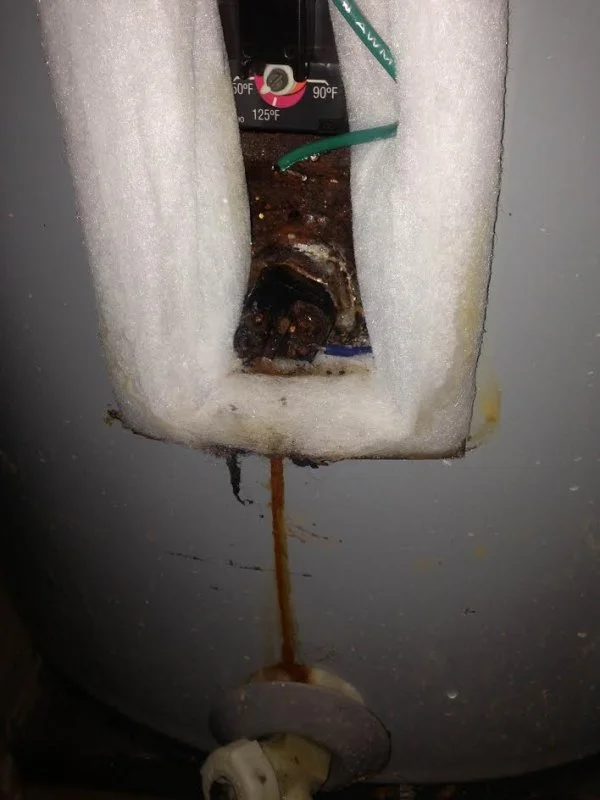
Take a look at the above picture. It seems the water is leaking just below the thermostat, right? The last time when I encountered this issue, I also thought about the water coming out of the thermostat.
But the good news is- the thermostat on the electric water heater will never leak. The water dripping out of the thermostat is from the heating element. There is a rubber gasket that seals the heating element at the tank opening. If that rubber gasket gets cracked or damaged, water starts leaking from there and wetting the thermostat area.
How To Fix:
I highly recommend you call a plumber if the water heater is leaking out of the heating element because it’s not a DIY project. The heating element is in the ‘live’ electrical area and it requires professional knowledge to deal with this problem.
Note: The electrolysis from the electric element can rust away from the tank in the heating element area. And you can’t fix it without replacing the tank.
Rheem Water Heater Leaking From Bottom
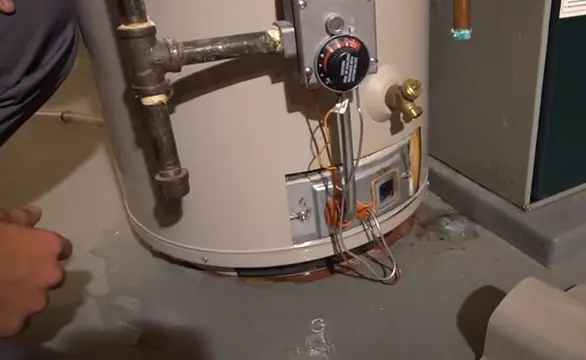
Your Rheem Water Heater is usually leaking from the bottom due to a loose or defective drain valve. Either way, a damaged inner tank can cause the water to pour out of the bottom of the unit. And this chapter will break down both these issues that allow water to leak from the bottom.
Drain Valve Gets Loose or Faulty
At the bottom of the water heater unit, you can find a drain valve. It helps you drain water and it’s specially designed for maintenance purposes.
If the drain valve is not completely closed, water will drip and flood the floor. Besides, a loose drain valve can allow water to leak. You can easily inspect the drain valve to see whether it’s leaking or not.
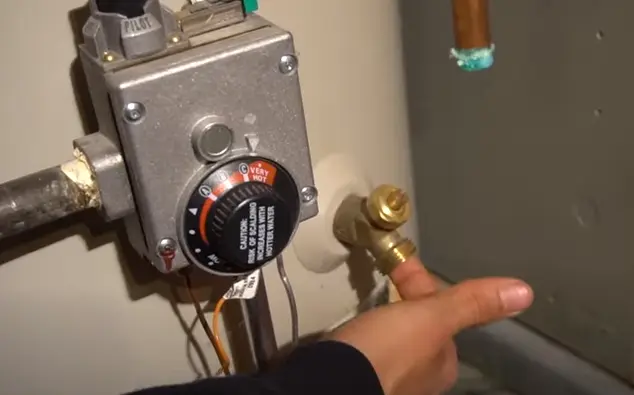
Just reach your finger to the drain valve hole. If you feel it wet, the drain valve may get loose or damaged.
Turns out, a defective drain valve is also responsible for leaking water out of the bottom of the unit.
How To Fix:
Tightening up the drain valve will sometimes fix the issue if the water is leaking due to a loose drain valve. Just use a pipe wrench and fasten the drain valve. Otherwise, you should replace it if water is still leaking out despite tightening up the drain valve.
Inner Tank Gets Damaged
The water heater will leak water out of the bottom if the inner tank gets corroded. A simple leak test will help you determine whether the inner tank gets damaged or not.
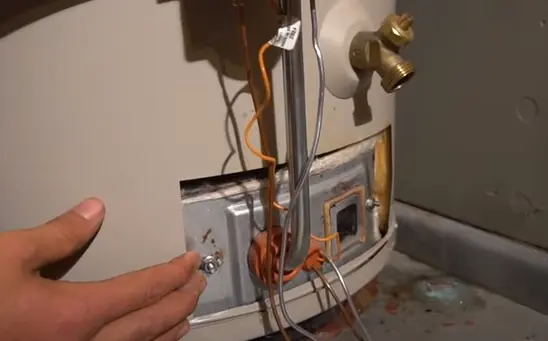
Take off the access panel cover. Then, feel inside with your fingers. If the insulation feels wet, there is a 99% chance that your inner tank is leaking, which is not repairable.
How To Fix:
As it’s not repairable, you need to get a new water heater. Basically, the inner tank gets damaged due to a lack of proper maintenance. You should flush the water heater tank every six months to remove sediment buildup. Regarding this, you can check out this guide ‘Will Vinegar Damage A Hot Water Heater’, where I broke down how to flush a water heater with vinegar.
Should a water heater that is leaking from the bottom be considered an emergency?
If your water heater is leaking from the bottom, it is a situation that requires immediate attention. Water drippings from the bottom of the unit can cause damage to your basement or flood your floors. The first culprit to check in case of a leaking water heater is the temperature and pressure relief valve. Tightening the valve with a wrench can often resolve the issue. If the valve or rubber gasket is faulty, you can replace it with a new one. Taking immediate care of a leaking water heater can help protect your floor and save you money in the long run.
Is A Leaking Water Heater Dangerous?
Yes, a leaking water heater is dangerous. When the water heater leaks, it can flood the room where you set the heater up. And guess what, the water may bring damage to your flooring, which may cost thousands of bucks.
A leaking water heater still does its job ‘heating water’ well. In other words, the water may get scalding hot which can burn your skin.
There is a minimum risk if the water heater is leaking unless it leaks from the T&P valve. It’s a safety mechanism of the water heater and releases pressure and temperature when both pressure and temperature exceed a certain level.
If you see the water is leaking from the pressure relief valve, turn off your water heater right off the bat. Then, call a professional for help to avoid further damage.
What To Do If Water Heater Is Leaking?
Do the following if your water heater is leaking:
- Ensure it’s your water heater that leaks water. Sometimes some owners consider the condensation as a leak. If you place the water heater near the AC or furnace, make sure these appliances are not leaking.
- Once you determine that the water heater is the culprit, turn the power off by flipping the circuit breaker that goes to the water heater.
- Turn the cold inlet water valve or the main water supply off.
- Locate the source from where the water is leaking out. Above, I mentioned some common places from where the water is pouring out.
- After finding out the source of the leaking, clean the water spills right off the bat. Otherwise, it will damage other parts of the heater. Fix the manageable issues. Luckily, I broke down some troubleshooting steps to solve the leaking problems.
- If the leak is not repairable or requires professional skills, don’t hesitate to reach out to a certified plumber.
End-Note
Improper maintenance or not maintaining the water heater causes your water heater to leak. For example, a corroded inner tank is the result of irregular or lack of maintenance. Your water heater demands to flush the tank every 6 months to remove the sediments. If you don’t do that, get ready to change the water heater if water is coming out of the inner tank.
Apart from this, there are other reasons (I mentioned above) that allow your water heater to leak water. What you need to do is- follow every troubleshooting step we described. I hope you can stop the water leak unless they are not repairable. In this case, turn off the water heater and call a professional for help.

Eric Alvarez is the head of content on LilDutchUncle.Com. He is an HVAC guy based in El Paso, Texas, United States. He obtained his Bachelor of Science degree from the University Of Texas at El Paso. Years of experience in the HVAC field have taught him many lessons, not the least of which is that the value of quality and knowledge far exceeds any promised initial savings. He has a good standing reputation for superior skills in heating, air conditioning, hot water tanks, and indoor air quality systems.
